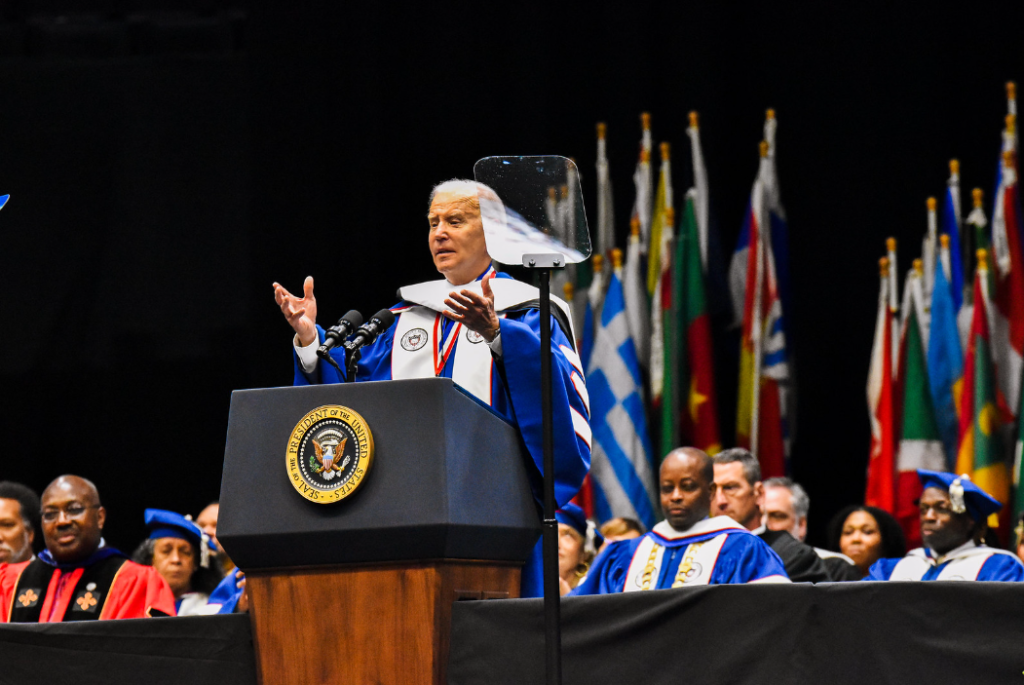
As artificial intelligence technology continues to grow, so do concerns about its usage. President Joe Biden wants to tackle this.
Last Monday, Biden set a governmental precedent on AI with an executive order in a move to limit the technology’s power before it gets out of control.
In the executive order, Biden issued a need for guidelines on technology’s use for several governmental departments and companies collaborating with the government.
“Artificial intelligence (AI) holds extraordinary potential for both promise and peril. Responsible AI use has the potential to help solve urgent challenges while making our world more prosperous, productive, innovative, and secure,” the order states. “At the same time, irresponsible use could exacerbate societal harms such as fraud, discrimination, bias, and disinformation; displace and disempower workers; stifle competition; and pose risks to national security.”
The executive order is a continuation of last year’s Blueprint for an AI Bill of Rights, which the White House published to establish a guide to navigating the use of AI. However, there was nothing made into an executive order or law until last week.
Over the last few years, instances of racism in AI have surfaced, causing concern that these outputs would discriminate towards racial minorities.
“Data that fails to account for existing systemic biases in American society can result in a range of consequences,” the blueprint states. “For example, facial recognition technology that can contribute to wrongful and discriminatory arrests, hiring algorithms that inform discriminatory decisions, and healthcare algorithms that discount the severity of certain diseases in Black Americans.”
Some computer science students at Howard say that this is due to the data AI is being fed.
“When it learns, it runs based off what you feed it, of course,” Esterie Bruno, a senior computer science major from Brooklyn, New York, said of discriminatory outputs from AI. “It would use the facial features that belong typically to people of European descent. Because these are people who have the advantage over any industry.”
Meaning, that due to the prevalence of White people in the tech industry developing AI and controlling the data that goes into it, would cause the technology to have a bias towards people of European descent over others. As a result, individuals without these features won’t be categorized as “someone who is a living being,” Bruno says.
Ujjawal Shah, a sophomore computer science major from Kathmandu, Nepal, who worked with AI and published research, came to a similar conclusion.
“Most of the data it has been trained on, the people were White, it has not been trained on [people of color]. It is biased towards people who are not of color. I think it’s one of the major things AI has been lagging behind,” Shah said. “It doesn’t actually represent all of the demographics of the U.S., and that’s been a concern.”
The blueprint and the executive order stated that it would monitor the AI’s algorithms to detect discrimination and inspect cases where AI discrimination is suspected to come into play.
National Association for the Advancement of Colored People (NAACP) President and CEO Derrick Johnson acknowledged that Biden’s executive order was making progress, but not completely there.
“The NAACP applauds the Biden Administration for taking the proactive steps necessary to make equitable outcomes a reality amidst the growing utilization of artificial intelligence,” Johnson wrote in a statement last Monday. “However, this is just the beginning. Now, we must ensure that these safeguards are put in place and are applicable to all issues top of mind for Black America, especially voting rights. This is what leadership looks like.”
Microsoft President and Vice Chair Brad Smith posted on X, formally Twitter, last Monday about the executive order, calling it a “critical step forward.”
“This order builds on the White House Voluntary Commitments for safe, secure, and trustworthy AI and complements international efforts through the G7 Hiroshima Process,” Smith wrote. “AI promises to lower costs and improve services for the Federal government, and we look forward to working with U.S. officials to fully realize the power and promise of this emerging technology.”
As one of the leading companies in the tech industry, Smith’s post indicates a positive outlook for the executive order and compliance with the guidelines it plans to establish. This could mean an easier transition to ensure equitable outcomes for AI.
Shah and Bruno both expressed interest in the progress the executive order made but cautioned its implementation.
“I think this is a really inclusive step in making AI safe and making it available to everyone without creating any bias… Talking about transparency or effectiveness, I’m not really sure how effective it’s going to be. Only time will really tell,” Shah said. “I think having some sort of laws and boundaries is going to have some impact on how AI can be used as a business itself, because you can build a chatbot and throw [it] out there in the Dark Web and nobody’s going to know.”
“Definitely get the best ethnic, techno-savvy people on an idea like that,” Bruno said. “I think it’s good, but everything has its double-sidedness. I won’t knock it ‘til I see it in progression.”
Kayden Graves, a junior electrical engineering major from Los Angeles, expressed discomfort with “AI discrimination, particularly as it pertains to Black individuals,” and is both optimistic and cautious about Biden’s executive order.
“I truly believe that anything is possible, and I want to remain hopeful and answer with a ‘yes’ to the question of whether the Biden Administration could effectively address the issue of discrimination arising from AI,” Graves said. “While the ambition to address this issue is commendable, it’s important to have robust mechanisms in place to monitor and hold accountable those companies or entities that may misuse AI to discriminate against specific groups.”
Copy edited by Alana Matthew













